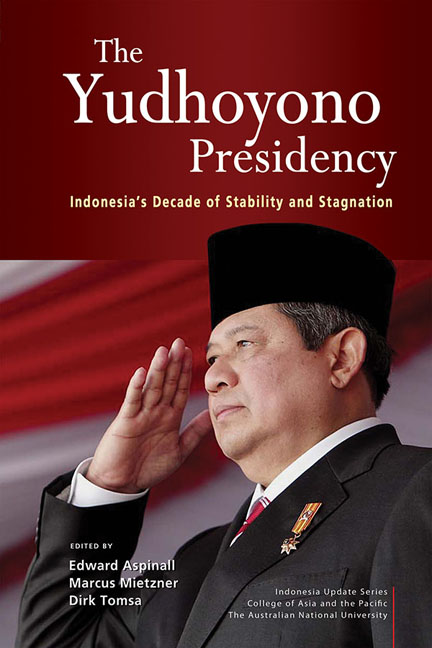Book contents
- Frontmatter
- Contents
- Tables and figures
- Contributors
- Acknowledgments
- Glossary
- 1 The moderating president: Yudhoyono's decade in power
- 2 Prologue Yudhoyono's legacy: an insider's view
- PART 1 PERSONAL, COMPARATIVE AND INTERNATIONAL PERSPECTIVES
- PART 2 INSTITUTIONS, POLITICS AND SECURITY
- PART 3 GENDER, HUMAN RIGHTS AND ENVIRONMENT
- PART 4 THE ECONOMY AND SOCIAL POLICIES
- 15 The Indonesian economy during the Yudhoyono decade
- 16 The Yudhoyono legacy on jobs, poverty and income distribution: a mixed record
- 17 Ambitious but inadequate: social welfare policies under Yudhoyono
- Index
- Miscellaneous Endmatter
16 - The Yudhoyono legacy on jobs, poverty and income distribution: a mixed record
from PART 4 THE ECONOMY AND SOCIAL POLICIES
Published online by Cambridge University Press: 19 May 2017
- Frontmatter
- Contents
- Tables and figures
- Contributors
- Acknowledgments
- Glossary
- 1 The moderating president: Yudhoyono's decade in power
- 2 Prologue Yudhoyono's legacy: an insider's view
- PART 1 PERSONAL, COMPARATIVE AND INTERNATIONAL PERSPECTIVES
- PART 2 INSTITUTIONS, POLITICS AND SECURITY
- PART 3 GENDER, HUMAN RIGHTS AND ENVIRONMENT
- PART 4 THE ECONOMY AND SOCIAL POLICIES
- 15 The Indonesian economy during the Yudhoyono decade
- 16 The Yudhoyono legacy on jobs, poverty and income distribution: a mixed record
- 17 Ambitious but inadequate: social welfare policies under Yudhoyono
- Index
- Miscellaneous Endmatter
Summary
Outcomes in the general area of job creation, poverty and income distribution were ambiguous during the Yudhoyono years. Jobs growth flip-flopped between rapid expansion of informal jobs in President Yudhoyono's first term, and then of formal employment during the resources boom in his second term. On the positive side, rates of poverty declined almost continuously throughout his period in office, and policy in this area was one of the big achievements of his presidency. But these improvements for the poor were not reflected in a better distribution of income. In fact, inequality worsened strikingly during Yudhoyono's second term of government.
Although strong and sustainable jobs growth can be associated with both declining poverty and improvements in income distribution, in Southeast Asia rapid economic growth has quite often been associated with rising inequality (Booth 1999). Indonesia appeared to be the exception during the Suharto period but there are good reasons to expect that this may not be the case now. While poverty alleviation is widely accepted as a legitimate focus of government policy, middle-class interests have more influence in a democratic polity, and these will not always favour rapid employment growth or more equitable fiscal arrangements. Moreover, organised labour did not support policies that could have achieved a more rapid expansion of blue-collar jobs in Indonesia in the early reformasi period, and subsidised energy and other fiscal arrangements have mainly benefited the better-off, facilitating growing inequality (Manning 2010; Dartanto 2013).
President Susilo Bambang Yudhoyono projected a greater concern for and a deeper knowledge of policy alternatives in areas affecting the welfare of the poor than any of Indonesia's first three reformasi presidents, B.J. Habibie, Abdurrahman Wahid and Megawati Sukarnoputri.1 This chapter will show that he oversaw considerable progress in social programs oriented towards overcoming poverty, and that he personally supported some major innovations in this field. At the same time, the president's extreme caution in policy-making in areas affecting the poor, his aversion to conflict and his need to take political calculations into account all meant that his government avoided making some difficult decisions that could have benefited lower-income groups much more.
- Type
- Chapter
- Information
- The Yudhoyono PresidencyIndonesia's Decade of Stability and Stagnation, pp. 303 - 324Publisher: ISEAS–Yusof Ishak InstitutePrint publication year: 2015

